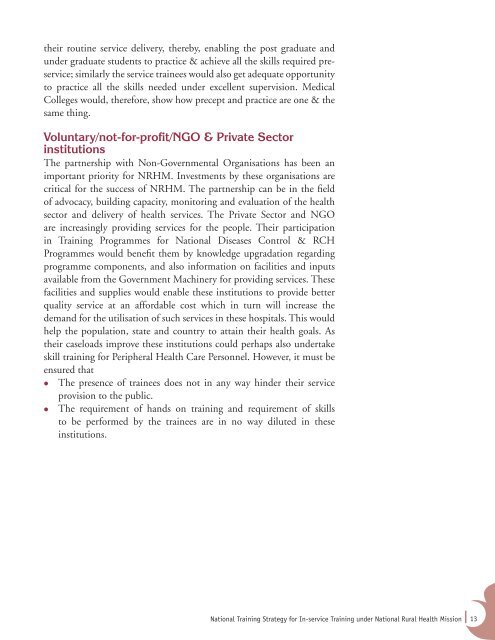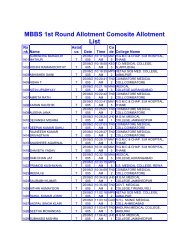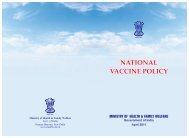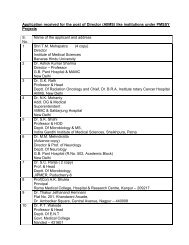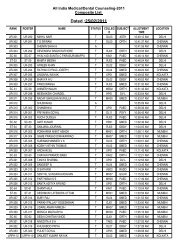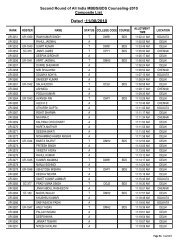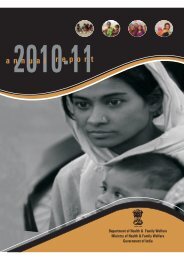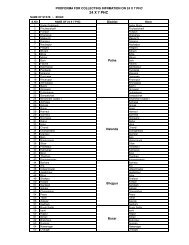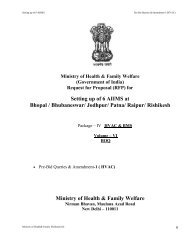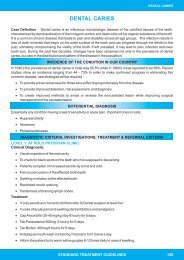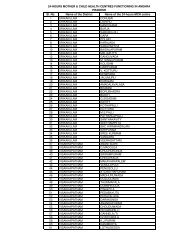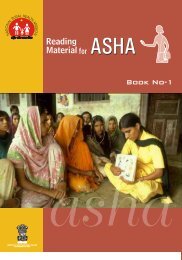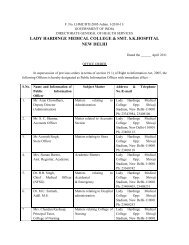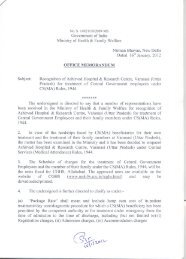National training strategy - Ministry of Health and Family Welfare
National training strategy - Ministry of Health and Family Welfare
National training strategy - Ministry of Health and Family Welfare
You also want an ePaper? Increase the reach of your titles
YUMPU automatically turns print PDFs into web optimized ePapers that Google loves.
their routine service delivery, thereby, enabling the post graduate <strong>and</strong><br />
under graduate students to practice & achieve all the skills required preservice;<br />
similarly the service trainees would also get adequate opportunity<br />
to practice all the skills needed under excellent supervision. Medical<br />
Colleges would, therefore, show how precept <strong>and</strong> practice are one & the<br />
same thing.<br />
Voluntary/not-for-pr<strong>of</strong>it/NGO & Private Sector<br />
institutions<br />
The partnership with Non-Governmental Organisations has been an<br />
important priority for NRHM. Investments by these organisations are<br />
critical for the success <strong>of</strong> NRHM. The partnership can be in the field<br />
<strong>of</strong> advocacy, building capacity, monitoring <strong>and</strong> evaluation <strong>of</strong> the health<br />
sector <strong>and</strong> delivery <strong>of</strong> health services. The Private Sector <strong>and</strong> NGO<br />
are increasingly providing services for the people. Their participation<br />
in Training Programmes for <strong>National</strong> Diseases Control & RCH<br />
Programmes would benefit them by knowledge upgradation regarding<br />
programme components, <strong>and</strong> also information on facilities <strong>and</strong> inputs<br />
available from the Government Machinery for providing services. These<br />
facilities <strong>and</strong> supplies would enable these institutions to provide better<br />
quality service at an affordable cost which in turn will increase the<br />
dem<strong>and</strong> for the utilisation <strong>of</strong> such services in these hospitals. This would<br />
help the population, state <strong>and</strong> country to attain their health goals. As<br />
their caseloads improve these institutions could perhaps also undertake<br />
skill <strong>training</strong> for Peripheral <strong>Health</strong> Care Personnel. However, it must be<br />
ensured that<br />
� The presence <strong>of</strong> trainees does not in any way hinder their service<br />
provision to the public.<br />
� The requirement <strong>of</strong> h<strong>and</strong>s on <strong>training</strong> <strong>and</strong> requirement <strong>of</strong> skills<br />
to be performed by the trainees are in no way diluted in these<br />
institutions.<br />
<strong>National</strong> Training Strategy for In-service Training under <strong>National</strong> Rural <strong>Health</strong> Mission 13


